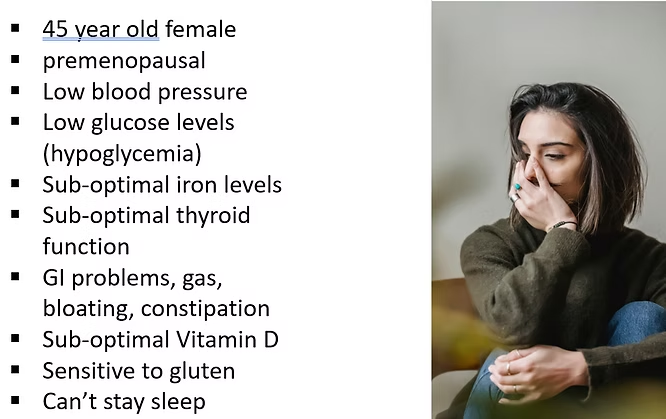A Common Scenario
In this example, let’s imagine a fictional female client who is facing several health challenges. Although she is not a real person, these symptoms are quite common among the patients I work with daily, and they might resonate with your own experiences.
The Client Profile
Our patient is a 45-year-old woman who is premenopausal. She has been diagnosed with low blood pressure, low blood sugar, and deficiencies in iron and thyroid functions. Additionally, she experiences gastrointestinal issues like gas, bloating, and constipation. Other concerns include low vitamin D levels, gluten sensitivity, and difficulty staying asleep.
The Ineffectiveness of Conventional Approaches
The conventional healthcare system often fails to provide effective solutions for this type of client. Typically, they would label her fatigue as a symptom of depression and prescribe an antidepressant. When addressing her gastrointestinal problems, they might diagnose it as GERD and prescribe medication that could disrupt her system further. In an attempt to alleviate her sleep issues, they might even introduce a third medication specifically for sleep.
This process continues, resulting in a cycle of medication dependency that offers no real solutions.
The Functional Medicine Approach
In contrast, functional medicine provides a better alternative for our client. Instead of dismissing her symptoms, I would acknowledge their validity and propose a natural treatment approach. Our goal is not to rely on medications but rather to enhance her body’s innate healing abilities.
Step 1: Diagnostic Labs
To begin, we would conduct various lab tests to gain deeper insights into her condition. These tests reveal valuable information that can help identify underlying causes. For example, we may discover nutrient deficiencies or imbalances affecting her thyroid, sleep, or blood pressure regulation.
Step 2: Addressing Blood Pressure
As part of the process, we would prioritize checking her blood pressure. It’s common for women who seek my assistance to have low blood pressure. Since blood pressure plays a crucial role in nutrient delivery throughout the body, it becomes essential to address this issue first. Without improving blood pressure, any other intervention would have limited impact.
Step 3: Evaluating Blood Glucose Levels
We would also assess her blood glucose levels over time. This simple and affordable test provides insights into her sugar regulation throughout the day. It helps identify if she experiences poor sugar control, which can contribute to her symptoms.
Step 4: Examining Iron Levels
Considering her low iron levels, I would inquire about her fatigue and menstrual cycles. Heavy menstrual bleeding may result in excessive blood loss, disrupting the body’s iron regulation. Dietary factors might also contribute to the deficiency. Since iron is responsible for delivering oxygen to the body, low iron levels can lead to various problems.
Step 5: Focusing on the Thyroid
Unlike the conventional approach, we go beyond the cheapest thyroid tests available. We often uncover autoimmune diseases affecting the thyroid. This knowledge leads us down a different treatment path, tailored specifically to address the underlying autoimmune condition.
Step 6: Optimizing Vitamin D Levels
In mainstream medicine, a vitamin D level between 30 and 100 is considered acceptable. However, I prefer to see my clients closer to 80. Thus, we would introduce vitamin D supplementation to her diet, ensuring she reaches optimal levels.
Step 7: Identifying Food Sensitivities
We also examine our client’s food sensitivities to address her gluten and gastrointestinal issues. It’s likely that her diet has not received sufficient attention in the past. By making appropriate dietary adjustments, we can provide her body with the necessary nutrients while avoiding sensitivities.
Reaping the Rewards
As we progress in resolving these underlying issues, we often find that her sleep improves naturally, without the need for additional treatment.
The Power Within
You possess an innate ability to heal yourself. In the majority of cases, your body has the capacity to fix itself. It’s merely a matter of implementing the lifestyle changes necessary to support proper bodily functions.
Embracing Functional Medicine
Functional medicine is designed to identify and address any dysfunctions within your body, enabling it to return to its optimal state. Our approach involves developing an individualized treatment plan tailored explicitly to your unique needs and circumstances.
Reach Out for Solutions
If you’re struggling with an unresolved health issue and finding it challenging to obtain an accurate diagnosis or effective treatment, don’t hesitate to contact me. Together, we will collaborate to discover the solution your body requires to regain wellness.
Frequently Asked Questions (FAQ)
Conventional care tends to treat symptoms in isolation—prescribing antidepressants for fatigue or reflux medications for gut issues—without addressing the root causes, which leads to ongoing medication dependency.
Functional medicine looks at the whole picture by running detailed labs, checking nutrient status, and addressing underlying dysfunctions such as low iron, thyroid imbalance, blood sugar regulation, and food sensitivities.
Deficiencies in vitamin D, iron, and other nutrients can cause fatigue, poor sleep, brain fog, and low immunity. Functional medicine focuses on restoring optimal nutrient levels to support the body’s natural healing.
Yes. By addressing underlying causes such as blood sugar swings, low blood pressure, thyroid imbalances, or food sensitivities, sleep often improves naturally without needing sleep medication.








